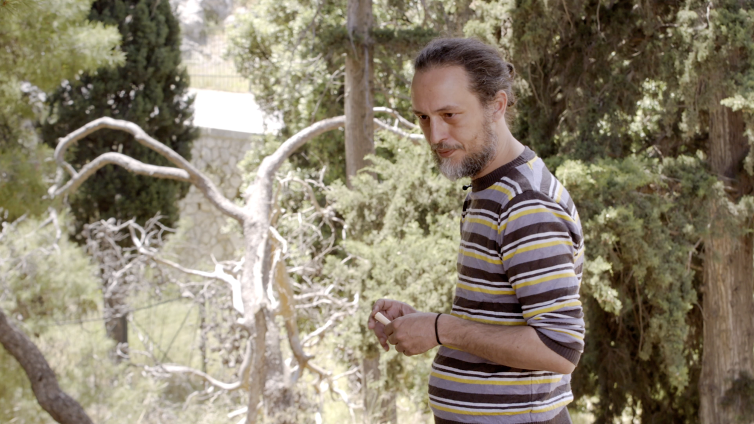Come see Out Of The Ruins, a film about democracy reborn in Greece, at our Zoom Watch Party on 22nd June
Opening shots of “Out of the Ruins”
It’s our regular joy to bring what can only be described as “democratic culture” to the channels of the Daily Alternative - sometimes in websites and initiatives, but also sometimes in the form of beautifully-made and inspiring documentaries. We have one of those before us - and we’re inviting you come and join us in a watch party for it.
The open assembly in Embros, Greece - a still from Out Of The Ruins
The 30 mins documentary is made by leading “citizen-journalist” Patrick Chalmers (well profiled on these pages), and it’s called Out of The Ruins - a meditation on forms of bottom-up democracy and assembly, using material and voices recorded during the Greek elections last year.
We are having a Zoom-driven watch party to help launch the film at 5pm, June 22nd (register here), or click in app below.
This will be followed by a Q&A session with Patrick, hosted by visionary for the future of Greece (and A/UK friend) Mary Valiakas.
We asked Phil Adams, executive producer of All Hands On (the company who made the film, that he jointly owns with Patrick Chalmers), to write a blog previewing the movie - see below.
Aristotle would be very puzzled by the way in which a world which is completely oligarchic is calling itself democratic. What we now have, which is oligarchy with elections, would have struck him as the worst possible combination of the two.
These were the words of Yanis Varoufakis, ex-finance minister of Greece and co-founder of DiEM25, when he spoke to journalist and filmmaker Patrick Chalmers on the night of European Parliament elections in Athens in May 2019.
Through his not-for-profit production company, All Hands On, Patrick is making documentary films which aim to strengthen the resolve of political reformers, and to enthuse, educate and empower ordinary people to become politically literate and politically active.
The film that Patrick made in Athens is called Out Of The Ruins.
Athens in May 2019 was the ideal place and the ideal time to contextualise and criticise what passes for democracy these days. The circus of modern elections was in full swing. Its failings were laid bare - the lack of representation afforded by a supposedly representative system. The partisan hostility. The ritual intransigence.
Athens in May 2019 was also a great place and a great time to shine a light on citizen-led alternatives.
Amidst the pollsters, the rallies, and the flag-waving, crisis-weary Athenians voiced their disillusion with politics as usual. Most had suffered heavily under extreme austerity. They had witnessed collusion between governments and banks. Instead of voting, many preferred to explore alternative forms of democracy, which were more in the spirit of Ancient Athenian traditions.
Athens was the birthplace of democracy as democracy was intended to be, namely power exercised directly by the people (the demos). As Varoufakis pointed out, the Ancient Athenians saw elections as inherently oligarchic, and they played no part in their original democracy.
Some modern-day Athenians are going back to their radical democratic roots. For the political tourist, there are some imaginative and uplifting outbreaks of deliberative people power in Athens if you know where to look.
Out Of The Ruins shows this pop-up democracy in action.
The Pagkaki Café Collective operates without any management hierarchy. The workforce makes all decisions together, as equals, in weekly assemblies.
In a squatted high school in the Exarcheia district, migrants and refugees self-manage through respectful deliberation. Patrick spoke to Solemaine Dakdouk (“Kastro”) about the democratic principles that underpin their decision making:
Now, how does this operate? On the basis of self-management, away from any type of prejudice, of political prejudice. The concept of democracy is something ideal, to be able to co-exist and accept one another as we each are and not as we want people to be.
Embros is an occupied theatre space in the Psirri District. Here too, decisions are taken by relatively large groups of equal voices, deliberating their way to consensus. Seventeen-year-old student Nayada Sagris describes the hard work involved in participatory democracy, but also the intensely rewarding experience of self-determination.
I believe democracy is a continuous, and definitely not an easy process. And a lot of problems are created. Democracy is a very open thing that involves many different people. And, of course, not everyone is happy with every decision. Mistakes are necessary, quarrelling is necessary because that will lead to discussion and acceptance, to mutual acceptance.
Out Of The Ruins employs an interesting and educational narrative device to bridge between segments of film. Patrick organised a democracy workshop on a hill beneath the Acropolis, looking over to the Pnyx, the site where Ancient Athenian citizens gathered in their thousands to make policy decisions for the city. The workshop was moderated by political philosopher Alexandros Schismenos, a “modern day Aristotle.”
Schismenos makes the link between politics and philosophy, and he discusses the Ancient Athenian use of random selection to appoint people to administrative positions. And, for this article, Schismenos brings us full circle to the observation made by Varoufakis at the beginning.
Politics for Aristotle is the most supreme of arts - because it is the art of how we live our lives. In democracy, the citizen is truly the citizen. It is the only regime that he [Aristotle] considers gives the possibility to the citizen to truly rule himself.
Aristotle says that oligarchy is when offices are assigned through elections. That differentiates oligarchy from democracy, where offices are appointed by lot. The demos, the people, are those who rule over everything. And they are right because the few, the oligarchs, are easier to corrupt than the many.






